In America’s Science Classrooms, the Creep of Climate Skepticism
Steve Vernon lives with his wife in a meticulously manicured country club community secured by watchmen in guard booths. He is also a leader of the Florida Citizens’ Alliance, a conservative, 20,000-member organization based in Naples that spearheaded a successful grassroots effort last year to pass the nation’s first state bill allowing residents to demand a public hearing on local school textbooks. With its passage, parents of students — as well as anyone living in a given district — can challenge the books a school is using to teach their community’s children. It was a seemingly parochial piece of civic legislation, but it was one with potentially great implications for science education in the United States.
On a bright afternoon in September, as Hurricane Florence was lashing the shores of states just a few hundred miles north, Vernon, a retired IBM contracts negotiator and Marine Corps veteran, answered his door barefoot, wearing shorts and a green t-shirt. He had joined the Florida Citizens’ Alliance as a board member in 2012, initially inspired by the organization’s gun-rights advocacy. In fidelity to the IBM corporate ethos, Vernon and others in the Alliance recognized that the group wasn’t optimizing its potential appeal to the Florida citizenry, so they commissioned a team of consultants to evaluate the group’s strategy for obtaining new members.
“That’s when we decided we were a ‘Liberty Education’ organization,” Vernon said at his dining room table, reflecting on the organization’s decision to give up its laser focus on Second Amendment causes and begin promoting the teaching of conservative values to children. “Membership increased significantly when we started saying, ‘Look at what’s in our textbooks,’” Vernon said.
“The textbooks,” he added, “are a perfect reflection of the education system.”
Prominent on the group’s expanded menu of concerns was climate change, and humanity’s presumed role in driving it. The Alliance’s members began line-reading school textbooks for violations of their beliefs, creating carefully detailed reports on how many times, and in what context, elementary and high school students were learning about rising seas, or melting ice in Antarctica. “Unfortunately, what it’s become is indoctrination and not education. That’s our major problem,” Vernon said, echoing a prevailing concern among members of the Alliance and likeminded conservatives everywhere: the unchecked power and control over social institutions by perceived liberal elites. “We’re really concerned,” he added, “that our kids are not being educated, [but] simply indoctrinated in the philosophy of the academic aristocracy.”
With the ascension of the Alliance, the Sunshine State has become ground zero for an intensifying ideological battle taking place across the nation — one that has conservative groups wrestling for control over how climate science will be taught to American students. The science classroom, after all, remains the dominant venue in which those students first encounter the topic, and it greatly informs how students eventually square-up to the veracity of climate change — either as something they believe to be happening and worth responding to politically, or as a phenomenon of nature, underserving of public funds and political action.
The outcome matters: Whoever wins over the minds of this upcoming cohort of American voters will, to a large extent, shape the nation’s policies on climate change for decades to come. Surveys suggest that more Americans than ever now understand the human-climate change connection, but as voters head to the polls for the 2018 midterm elections, more than 40 percent still remain unconvinced that climate change is predominantly caused by human activity. The best way to nudge that number higher, conservative groups seem to be wagering, is to target youngsters in America’s science classrooms.
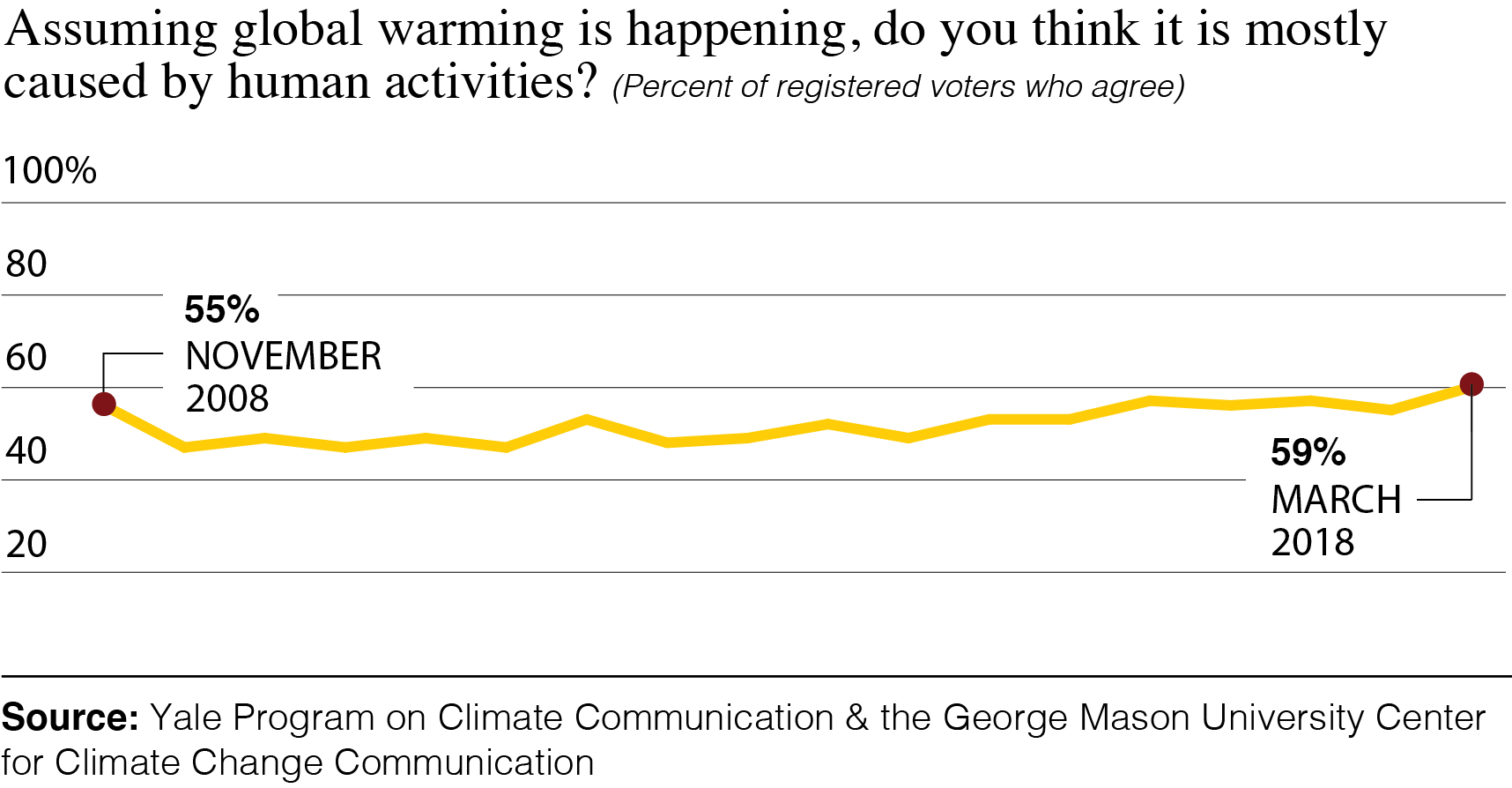
The Alliance’s first attempts to combat existing school curricula weren’t entirely successful. There are 67 public school districts in Florida, one in each county, which purchase new textbooks for different subjects on a year to year basis. In many states, due to lack of funding, effective policies, or both, teachers still use older textbooks, which some studies have found underplay the level of consensus among experts on basic climate science.
Using the textbook reports generated by their members, the Florida Citizens’ Alliance initially appealed piecemeal to various school districts with what it considered the most egregious textbook content, urging them to replace or correct the erroneous material. “But the bottom-up approach was going nowhere,” Vernon recalled, with the school districts ignoring their pleas.
Then, in 2016, as Donald J. Trump secured the White House on a campaign rallying against elites in power, the Alliance leadership decided to aim above the county and district level, setting their sights on the Statehouse. It was possible, they realized, that a legislative bill could force every school district to capitulate to their concerns in one fell swoop, optimizing their statewide efficiency.
Already, the Alliance had seen some of their occasionally far right positions being adopted as mainstream views by Florida politicians, particularly around climate change. “The legislators became less fearful of thinking differently, of not being so establishment oriented,” Vernon told me, noting that ideas that had once been politically unsavory could now be effective tools to raise campaign funding. “The idea that climate change wasn’t man-made was something politicians could now take out on the campaign trail,” Vernon said.
Before each annual legislative session, members of the Florida Congress host meetings with their respective districts, allowing constituents to bring forward issues for their representatives to address during the legislative period. Ahead of the 2018 session, the Florida Citizens’ Alliance utilized their deep membership base to create “watchdog groups” across the state’s districts. Divided into research and presentation teams, they used a codified system of textbook review techniques to comb for offending mentions of climate change, along with other content they perceived as heretical — from gun control to normalization of the Islamic faith. As Florida’s representatives held their meetings, they continually encountered a cohesive message from the Alliance, with their presenters depicting a troubling liberal indoctrination of Florida’s children.
“A representative might have three or four of these meetings,” Vernon said, “and in each county he’d hear a Citizens’ Alliance presentation.”

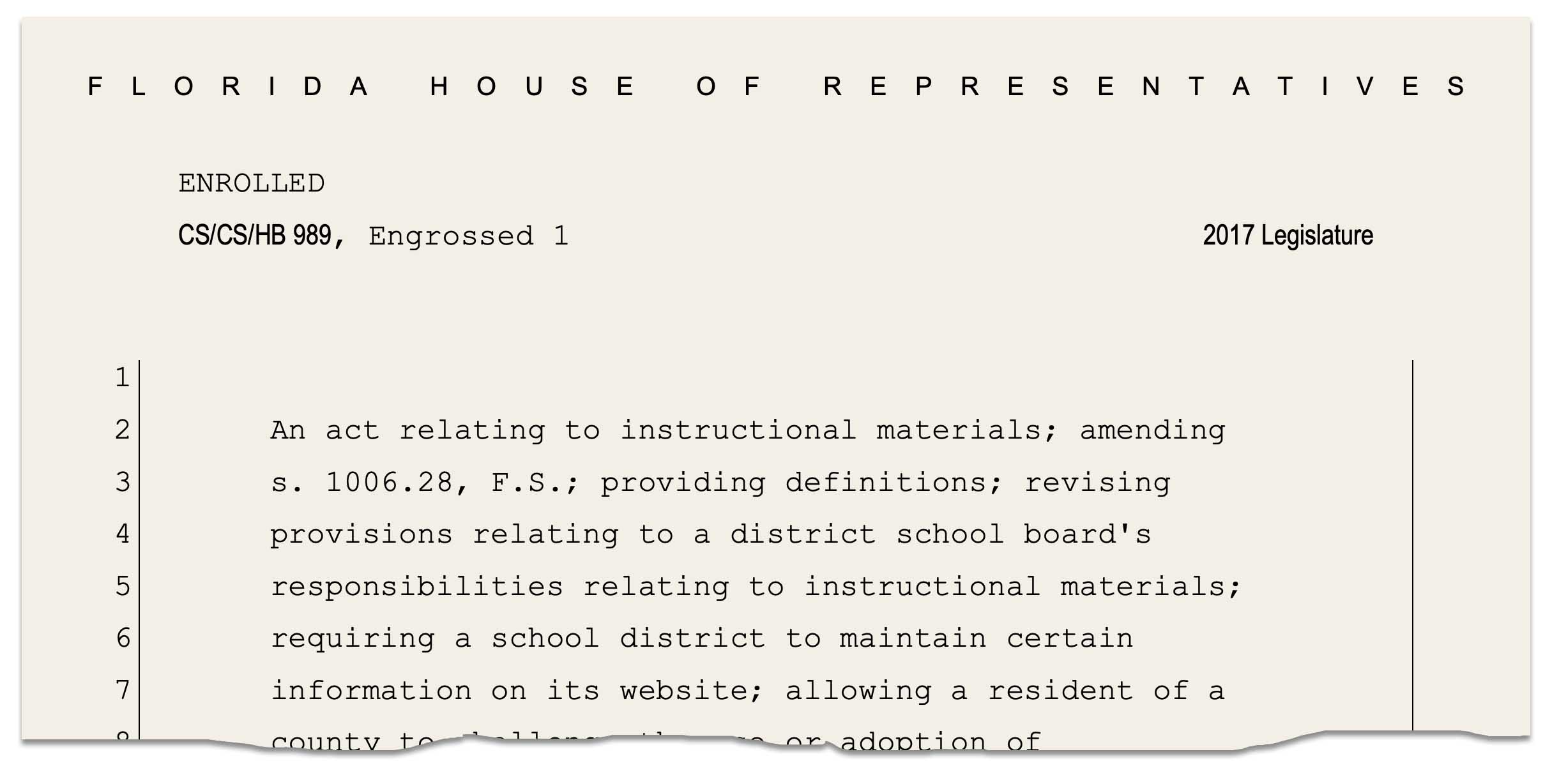
While the rank-and-file watchdog groups blanketed the state, the Florida Citizens’ Alliance leadership initiated their own campaign at the Statehouse in Tallahassee, spending months cultivating allies for their education bill. To make the bill more politically palatable, they imbued the campaign around it with a tone that wasn’t so much reflective of bipartisan politics as it was a gesture of consumer protection, arguing that every taxpayer who contributes money to the schools should get to decide how that money is allocated. This wasn’t a bill prioritizing one ideology over another, supporters suggested; it was a piece of legislation that treated everyone’s tax dollars fairly.
It was a rhetorical turn that spoke directly to longstanding conservative objections to mainstream textbooks, which they often view as a liberal playground. Such arguments — and conservative outrage — were stirred anew this past spring, for example, when a Minnesota student shared images online of a new history textbook that included some of the criticisms that have been leveled at Trump by his detractors. (The book also included common critiques of former president Barack Obama and 2016 Trump presidential challenger Hillary Rodham Clinton.)
“Liberals needn’t bother keeping track of history textbooks,” wrote Stanley Kurtz, a senior fellow at the Ethics and Public Policy Center, in an essay on the dustup for the National Review in May, “because they’re the ones who write them.”
When Florida’s textbook bill, known as HB989, was signed into law by Republican Governor Rick Scott last summer, the Alliance knew it had achieved a major win — and it was one that brought them to the attention of both grassroots and national organizations across the country. To date, the Florida Citizens’ Alliance has worked in varying capacities, both formal and informal, with a rich cast of national and regional conservative groups, from the Washington, D.C.-based Cato Institute to Truth in Textbooks (TNT), a Texas-based organization that trains activists through online courses and in-person workshops to review school textbooks and identify passages that they consider problematic.
Florida’s textbook law provides “the ideal template,” said TNT’s founder Roy White. The Alliance’s “grassroots effort and the legislative effort” have become standardized, he said, adding that other states “could point to Florida and replicate what they’ve done.”
Vernon echoed that sentiment. “We’d love to say this is the way it should work in every state,” he said, “to give power back to the people and to take it away from the education aristocracy.”
In September, the country’s largest science teacher group, the National Science Teachers Association, released a statement on the nationwide tensions simmering around climate literacy.
“Teachers are facing pressure to not only eliminate or de-emphasize climate change science, but also to introduce non-scientific ideas in science classrooms,” the statement said. While decision-making authority on public school textbooks differs between jurisdictions, with school boards and state officials exercising varying amounts of influence, lawmakers in Texas, Arizona, Louisiana, Arkansas, Iowa, Idaho, and Michigan have introduced — or passed — legislation that specifically targets state education standards, which school districts must adhere to in devising curricula. (Private schools have more latitude.) As with the textbooks, such state standards (which were successfully changed in Louisiana and Idaho) largely determine the parameters of what teachers are required to present to students.
The new bills mirror preceding efforts — often described as “academic freedom” measures — that reach back at least as far as the early 2000s, according to an analysis last year by PBS Frontline and the GroundTruth Project, a nonprofit journalism organization based in Boston. But the trend, some stakeholders have argued, appears to be both accelerating and becoming more targeted.
The co-founders of the Florida Citizens’ Alliance, Rev. Rick Stevens and Keith Flaugh discuss their textbook bill in this 2017 video.
Recently in Arizona, for example, after remaining unchanged for the past decade, the state’s Board of Education considered a proposal from outgoing State Superintendent Diane Douglas to remove references to climate change from each of their K-12 school district’s science curriculum standards. If adopted, the new standards would have mimicked a curriculum devised by the ultra-conservative Hillsdale College, a private Christian university in Michigan funded by the family of the Trump administration’s education secretary, Betsy DeVos, and other major conservative donors. In a vote last week, the board narrowly voted, 6-4, against Douglas’ proposal, instead adopting their own revised standards that retain references to climate change and evolution.
Earlier this year, a group of conservatives in Michigan fought for K-12 social studies standards that reflected the view that “global climate change is not settled science,” seeking instead a curriculum that did not promote climate change “theories as fact, [as they have] created an alarmist atmosphere in our classrooms.” Led by Republican state Sen. Patrick Colbeck, the Michigan conservatives were concerned that the repetitive presentation of climate change in classrooms had “motivated an increasingly large number of our students to pursue studies and careers in meteorology and environmental sciences.”
The senator’s apparent fear that students might grow up to one day become scientists — or simply citizens who vote for politicians willing to combat climate change — reflects a small but long-in-the-making victory for forces determined to give climate skepticism a solid beachhead in mainstream politics. From the White House to conservative-led statehouses, years of investment by major fossil fuel industry players are now bearing fruit in the war on climate literacy.
Much of that long-term financial investment has come from mega-donors like the billionaire Koch Brothers and the Mercer family, as well as fossil fuel corporations themselves. Between just 2003 and 2010, a Drexel University analysis found that these groups collectively contributed more than $550 million across 91 organizations that fought to deny the existence of climate change. Last year, ExxonMobil spread $1.5 million across 11 organizations espousing the climate denial doctrine.
Acting out these corporate interests, the Trump administration has continued to roll back or delay regulation on greenhouse gas emissions, some of which have remained in place for decades, unlocking hundreds of millions of dollars in new revenues in fossil fuel manufacturing. Meanwhile, the industrial byproducts spurred on by these newfound regulatory freedoms have all but accelerated what many scientists would describe as a march towards climate catastrophe. Augmenting this federal effort, state politicians and grassroots organizations have together focused on the schools, promoting a climate science skepticism throughout the U.S. educational system.
In the run-up to Florida’s textbook bill, the conservative Heartland Institute lent their support to the Florida Citizens’ Alliance by posting an analysis of Florida textbooks on their website, amplifying the organization’s attempt to remove “improper and unbalanced propaganda” from the school system. The Heartland Institute’s collaboration with the Florida Citizens’ Alliance dovetailed neatly with Heartland’s own large-scale effort which debuted the following year.
Ahead of the 2017 fall semester, Heartland, which to date has received more than $5 million in combined funding from the Koch Brothers and the Mercer Family, mailed copies of a book titled “Why Scientists Disagree About Global Warming” to virtually every public K-12 science teacher in the nation, and to private school and college educators as well. It was part of a series of Heartland books published in recent years. Before President Trump took over the White House in 2017, his transition team requested a climate change presentation adopted from their series of books that refute climate change.
“Vanishingly few global warming skeptics have ever been paid by the fossil fuel industry,” the editors write in a section from “Why Scientists Disagree” on how money can engender scientific bias. Along with these reactive, self-defensive passages, the book devotes a great many pages to attacking the conclusion by most mainstream scientists that catastrophic global warming is inevitable without limiting fossil fuel emissions. “The hypothesis implicit in all [such] writings, though rarely explicitly stated,” the authors declare, “is that dangerous global warming is resulting, or will result, from human-related greenhouse gas emissions.”
Passages like these — and the carpet-bombing distribution of the book to science teachers across the nation — took many people in the education system by surprise. “What was shocking about the [Heartland] mailing was the scale of it,” said Brad Hoge, director of teacher support at the National Center for Science Education.
“It made everyone step back and see this was a time to wake up and pay attention,” he added. Targeting teachers was “a bold and blatant thing to do.”
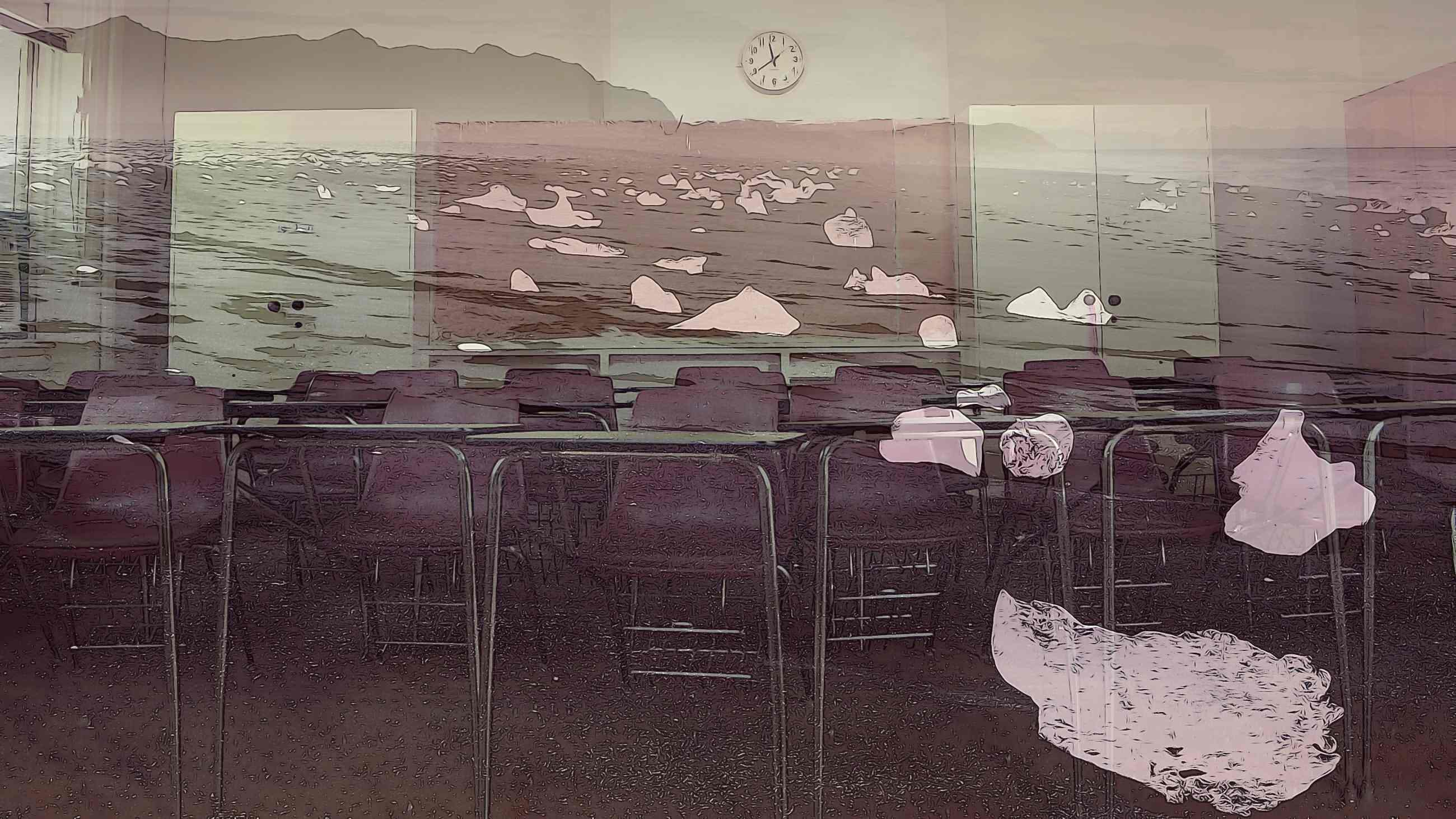
After Hurricane Florence made landfall in North Carolina in mid-September, it stalled near the shoreline. Moving as slow as 2 miles per hour, and engorged by warming ocean waters, the storm dumped more than three feet of rain in at least one area — more than ever previously recorded in the state. Like other extreme weather events, Florence had unusual characteristics, striking the coast of North Carolina and following a trail pattern that was farther north than typical Atlantic Ocean hurricanes, which raised the possibility of future extreme storms reaching parts of the country unfamiliar with such calamity.
Altogether, more than a million residents were left without electricity, and as neighbors rescued neighbors in boats from attic windows, there were fears in North Carolina — ones that would prove justified in subsequent days and weeks — that the rising rivers would lead to catastrophic flooding of toxic waste sites, with coal plants and hog farms threatening to spill out disastrous volumes of noxious byproduct into surrounding communities.
From the relative safety of mid-coast Florida, Brandon Haught was closely following the storm’s track. Haught teaches environmental science at University High School in Volusia County, about 30 miles north of Orlando, and he is a co-founder of Florida Citizens for Science, a coalition of teachers, scientists, and state residents providing organized resistance to Vernon’s Florida Citizens’ Alliance. A tall man in his 40s with wide shoulders, Haught had the furrowed disposition of someone who had spent the first five weeks of school trying to command the attention of the 140 freshmen under his supervision. In his classroom — empty of students on a Friday afternoon — there were pink and green activity buckets on the lab benches, and a NASA sticker on the laptop at his desk.
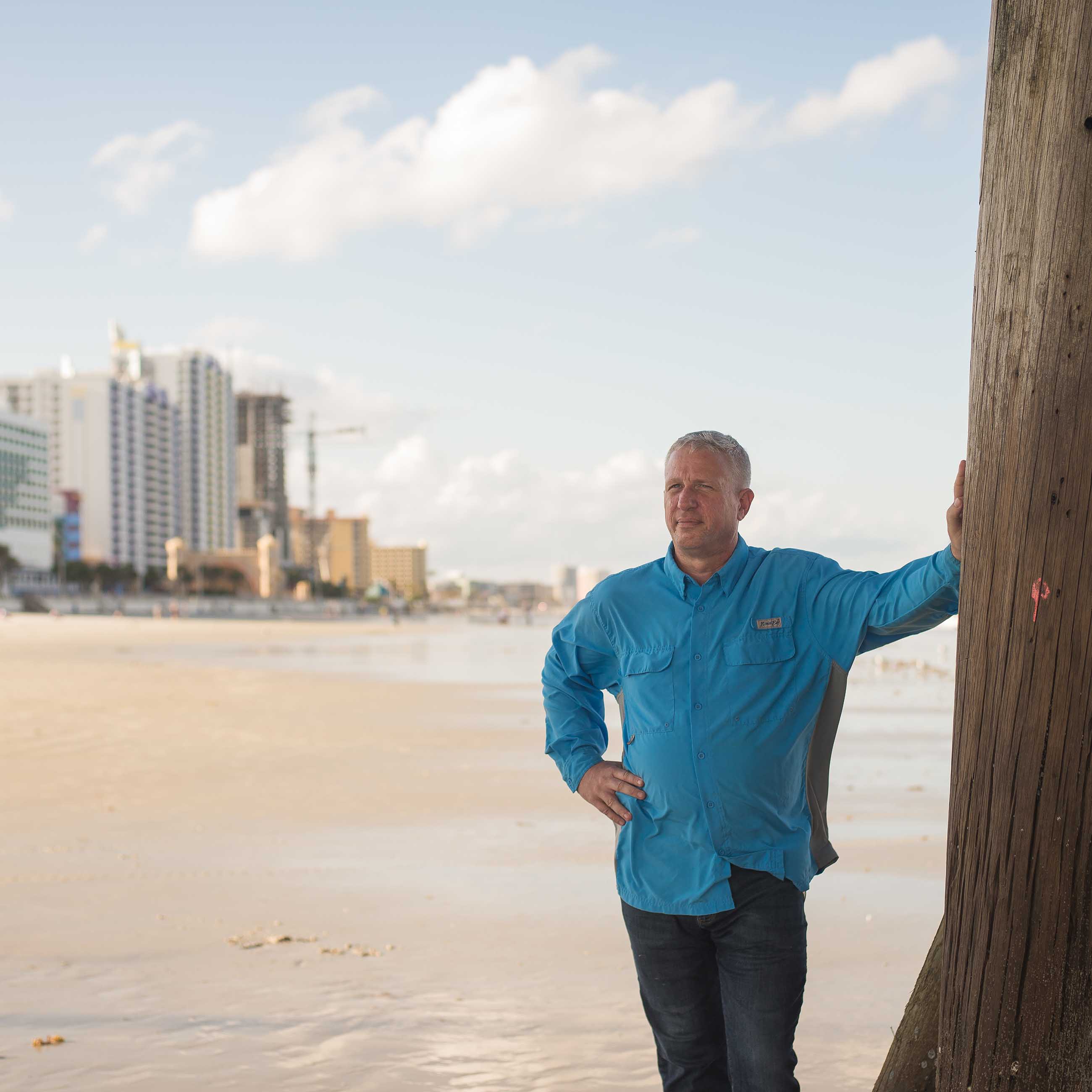
After the Florida Citizens’ Alliance pushed through the passage of HB989, Haught and the Citizens for Science kept a close eye on the Alliance’s efforts to bring the first round of challenges to district textbooks. At one of the first public hearings earlier this year, in Collier County, Haught spoke to the school board before residents came forward with their prepared critiques of the science textbooks. “I warned the members that they were going to be overwhelmed with a tsunami of information,” he recalled. “And I believe they’re doing that on purpose.
“If there are 100 complaints,” Haught continued, those defending the science will have to spend days refuting them, and “then it starts to look like two sides to the debate.” And that’s the goal, he said, to try to convince the board that there are two sides.
For advocates of inserting climate change skepticism into the classroom, the notion of “teaching both sides of the debate” is a familiar refrain, and it’s one used to mask the more fundamental motive: Fostering doubt in students that the scientific community conclusively agrees climate change is occurring. “It was a scatter shot,” Haught said of the lengthy testimonies that followed his comments. “Heck, one thing they complained about were the pictures of scientists [in the books] representing too many minorities. That was one of their complaints — there weren’t enough older white male scientists pictured.” Jaws dropped, he said.
But the sometimes-outlandish approach was nearly effective, with the Collier County School Board voting only narrowly, 3-2, to adopt the more mainstream science textbooks under consideration. Leaders of the Florida Citizens’ Alliance said that with the new bill in place, they will be in a position to pilot and test different strategies deployed at school board meetings. They plan to refine those strategies with challenges across all of the state’s 67 public school districts.
Rick Hess, director of education policy studies with the conservative American Enterprise Institute, said that while he was unfamiliar with the details of Florida’s new law, it appeared to be codifying many of the challenges brought by parents in school districts nationwide, seeking to have their children exempt from particular lessons or readings. “Frankly this is just one more version of the school choice conversation — how much do we want to empower families to have a say in what kinds of school environments, what kinds of structure materials, kids experience — and how much do we want to tell families, ‘tough.’
“Public education is always this web of compromises,” he added.
But Haught, the environmental science teacher, said the broader reach of the Florida Citizens’ Alliance and other anti-science forces throughout Florida has kept his group “constantly on the defense.” Even with that vigilance, he has already seen the climate skepticism of parents begin to percolate among students in his classroom. When one of his students spoke about a YouTube video touting the environmental benefits of excess atmospheric carbon dioxide, he was taken aback. Haught explained to her that they were still months away from the lesson on climate change, but when they got there she would see exactly why the video’s notion about high concentrations of carbon weren’t supported by science. After watching the video himself, Haught asked the student if she’d done the same.
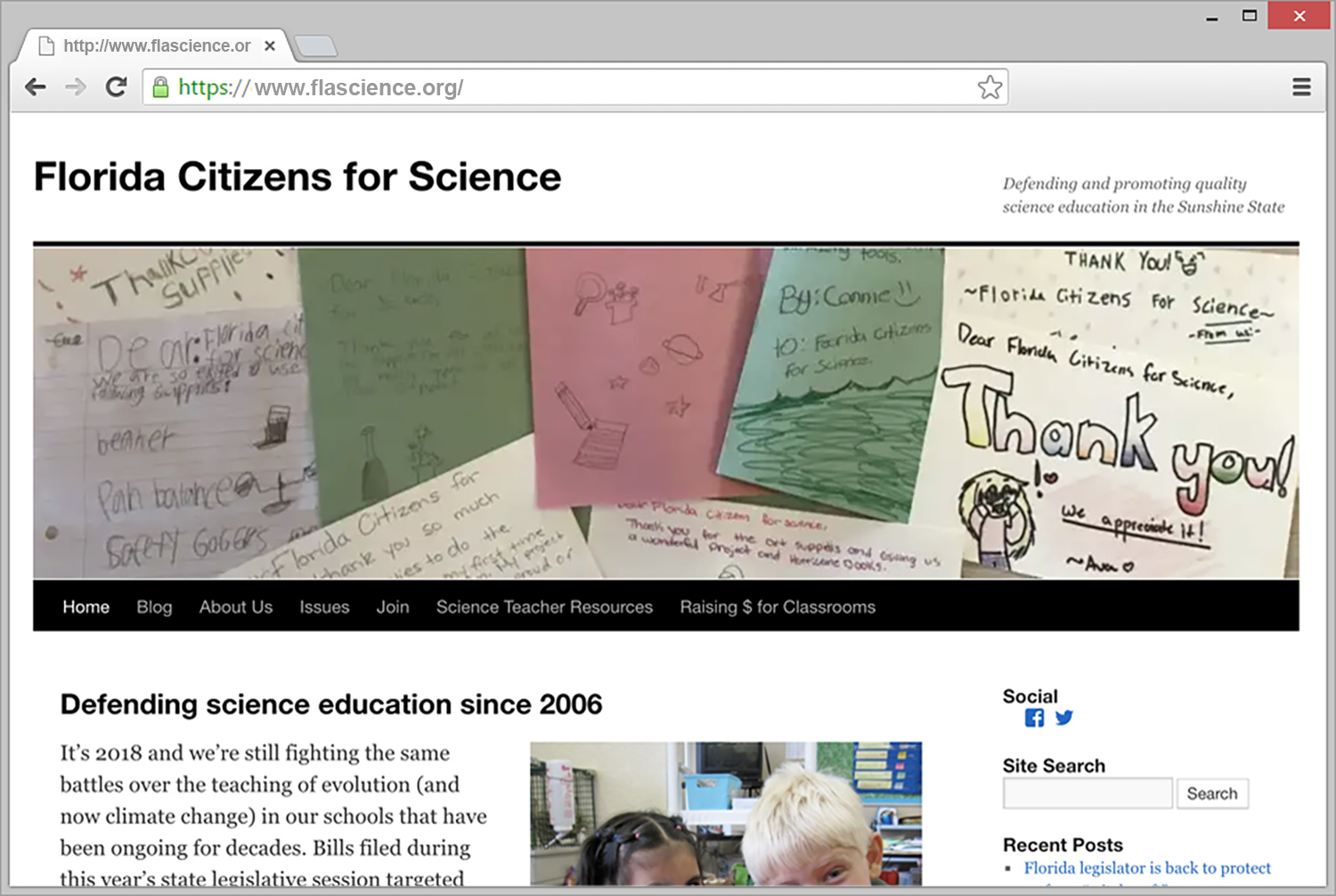
“She caved, admitting she hadn’t seen it,” Haught said. Rather, it was just something that her father had asked her to do.
Such sentiments have only been emboldened under the Trump administration. “It was a really scary time,” said North Carolina science teacher Kelly Pipes, recalling the slow realization within the science education community that Trump officials, after assuming control of federal agencies in 2017, were busy deleting decades of vital scientific information from government websites. On Trump’s first day in office, the White House had removed mentions of climate change from its homepage, while websites for the Department of State, Department of the Interior, Department of Energy, and other federal agencies were likewise scrubbed of data or findings supporting anthropogenic climate change and sea level rise.
“If you want this graph, this data, or this website, you better start downloading now,” Pipes, who teaches at Wilkes Early College High School in Wilkesboro, recalled thinking. “There was this urgency and people were frantically filling up jump drives and Dropboxes.”
The challenges Haught now sees from his own students echo those detailed by other teachers in other districts. They talk of teenagers coming into their classrooms unfamiliar with basic climate science, but nonetheless confrontational about it on principle, and parroting the skepticism promoted by their own family’s political affiliations. Students “come in knowing very little about climate change,” Haught said. “They’ve heard the term and they might have seen something in their social media feed, but they don’t really know what it is. They don’t know much about greenhouse gases.” If students have heard about carbon dioxide, Haught said, they don’t know what it means at a fundamental level.
“I feel it’s extremely important to give them that foundation,” he added, looking over the empty stools behind his lab tables. “They’ll make voting decisions and their lack of foundation is going to show. So I want to cut off this vicious cycle of people not knowing what climate change is making political decisions.”
Of course, not every science teacher is an unwilling audience to climate skepticism in their classrooms. Compounding the government’s liquidation of climate knowledge from the public domain, the conservative movement’s villainization of educators seeking better pay and benefits, while also orchestrating efforts to undermine teachers’ unions, has contributed to the ongoing exodus of qualified teachers from the school system. This has been particularly noticeable in the STEM subjects of science, technology, engineering, and math, where teachers can often find better paying jobs in the private sector. More than 40 states currently suffer from a shortage of K-12 science teachers, with one recent report estimating the nationwide shortage in all subjects to be more than 110,000 teachers for the 2018 academic school year.
For those science teachers who remain in the classroom, a comprehensive understanding of climate science itself is not a given. One recent report found that less than half of K-12 science teachers received formal climate science training during their own college education — a comprehension void that helps explain why political ideology has been shown to be the most consistent indicator of how a teacher presents climate science to their own students.
“The teachers at our school, even some in our administration, depending on their political leanings, that’s how they want to teach science,” Nina Corley, a science teacher at O’Connell College Preparatory School, a private institution in a conservative school district in Texas, told me. “So it’s not really about science, it’s more of a religious kind of thing,” in some ways harkening back to the Middle Ages when people refused to believe that the planets revolved around the sun rather than the Earth.
After Hurricane Harvey, the 2017 extreme weather event that killed 105 people and rendered more than $100 billion in damages, Corley took some of her students from Galveston to the nearby Gulf Coast to measure the local effects the catastrophe had on their area. The decimation of the town’s oyster and shrimp supply, and in turn a leading industry in the school’s community, convinced many of her students that climate change was real and happening right in their backyard — but some of her climate skeptic colleagues were harder to convince.
“The teachers know these things are going on, but to try to talk about why it’s happening is an extremely hard conversation to have. It challenges something for them that’s faith-based. They say, ‘This has been happening all along, climate change isn’t real.’”
For many science teachers attempting to communicate evidence-based information to their students, seeing other teachers present shoddy science can be an increasingly common exercise in frustration. One report by the National Center for Science Education, in collaboration with Penn State and Wright State universities, found that as many as five out of every 10 high school science teachers were unaware that climate scientists overwhelmingly believe climate change to be predominantly caused by human activity. Across middle schools, that average jumps to almost 7 out of 10 science teachers. But these competing conceptions about climate change aren’t always limited to the science classroom.
After her lesson on climate change, Erin Stutzman, an AP environmental science teacher at Timberline High School in Idaho, found that her students were being given contradictory information by Greg Sandmeyer, a social studies teacher down the hall, who had raised doubts about the veracity of her lessons.
“A few of the boys from his class came into my class, and they’re challenging me on not having enough research to support anthropogenic climate change,” that the data was flawed, she told me, noting that the teacher’s skepticism was one shared by Idaho’s own conservative legislators, who in recent years have been fighting to scrub the mention of man-made climate change from the state’s science standards.
“I realized that he was using the kids to try to discredit me,” she said of Sandmeyer. “He claimed that me and the other AP science teachers were acting out of fear and misinformation.”
Sandmeyer stands by his approach. “I urge students to be thoughtful and stick to the methodology of science,” he told me. “But it’s being expressed to the students that it’s settled science. That it’s a fact, that there’s no debate, so let’s pass laws and regulate what human beings do. Students lose sight of what real science is, and that’s where you get in trouble.”
Not unlike the climate science advocates in Florida who’ve had to patiently disassemble the bad-faith skepticism of textbooks at public hearings, Stutzman had to use her class time to methodically refute the challenges her colleague had cited to cast doubt on her climate science lessons. After making copies of Sandmeyer’s selection of blog posts and conservative websites, Stutzman was able to teach her students about the hallmarks of science propaganda — which increasingly passes for factual information on the internet. But having one teacher point out the fallacies of another teacher was jarring for Stutzman, as she could see how it undermined her student’s previously unwavering belief in the good intentions of their teachers.
“The students started to reflect on what was taking place in front of them,” Stutzman said. “One teacher is telling them ‘white is white’ and the other saying ‘white is black,’ and they struggle to know who to believe. It was a really sad moment for me, because you’ve got these kids and they want to trust their teachers, and when they lose that trust they lose a bit of their innocence.”
Trying to continue with lessons on climate science despite this intensifying atmosphere of hostility has forced some teachers to become savvier — or more secretive — about how they present the information to their students. In Texas, Nina Corley is careful to keep explicit mentions of climate change out of her lessons, for fear that her skeptical administrators might try to censor the science.
“The administrators in a school can have total control, because they’re your boss, you have to remember that. It’s going to be how you word it,” she said. “I’m not going to say my lesson plan is on climate change today, I’ll just talk about how we’re investigating the effects of carbon dioxide.”
Even in the classroom, Corley says she has to be careful about the language she uses with the students. “If you use the word climate change, then everything is automatically turned off,” Corley said. Students will just say “The President says that’s not true,” she told me, recalling one instance when she let slip the term “climate change” and the school’s star quarterback shot back. “That’s not true, and I’m not going to listen to it,” she remembered him saying.
“He was not being funny, he was being serious,” Corley said. In Texas, “if your star quarterback says something, it has to be true,” Corley added, observing the immediate effect it had on the rest of the classroom. The other kids weren’t going to say anything against him.
In the case of students with less clout over their fellow student body, a teacher’s attempt to challenge a teenager who’s an outspoken climate skeptic can often be a delicate process. Bringing with them the impassioned confidence inspired by the adults and politicians they look up to, the students can perceive the teacher’s presentation of hard facts as an attack on the adults they’ve previously had no reason to distrust.
Recalling one student who was hostile to her lessons on climate change, Erin Stutzman realized the more personal ramifications catalyzed by the student changing his mind. “He was tightly engrossed in the skepticism, that belief was engrained in him. And his initial resistance wasn’t to the science, really, it was that someone was challenging his parents and his friend’s parents,” Stutzman said, showing him that what he had been raised to believe was incorrect.
For the teachers who continue to prioritize accurate climate science in their lessons, there are few ways to measure how effectively they’re providing that information. Unlike history, math, or various hard science subjects, students are not tested in a standardized way to ensure they have a fundamental grasp of climate science principles. Likewise, for K-12 teachers, there’s no core competency in climate science subjects required to teach lessons on climate modeling or greenhouse gas emissions. For teachers who do wish to ensure they are fully-equipped to teach climate science, the burden often falls upon them to seek out time-intensive conferences, webinars, or self-directed lessons to become fluent in the subject matter. On average, teachers need at least 80 hours to become capable of making meaningful changes to how they teach a particular topic. If teachers are strapped for time or lack the budget to travel to across the country to a climate education conference, they’ll have to wade through the often-partisan environment of digital media to stay abreast of new findings.
“It used to be that in education we faced the problem of a lack of resources,” James Stewart, a high school science teacher and member of the Florida Education Association, told me. “But now the problem is the opposite — it seems like we have too many resources. And filtering through the internet and figuring out” what is factual information is a big challenge for teachers.
For new and veteran teachers alike, wading through the internet and its hyper-partisan points of view can mirror the acute resistance to accurate climate science they encounter from other teachers, administrators, students’ parents, and even the students themselves. The sudden and aggressive undertones in the battles for climate literacy have caught many teachers off guard, and left them feeling like they don’t have support to teach the science.
“It feels like we’re being swept up in a political issue that teachers aren’t prepared to deal with,” said Brad Hoge with the National Center for Science Education. “That’s what makes it overwhelming for a teacher — the opposition is out of the blue. Sometimes they just don’t know how to address the problem.”

At an IHOP in central Florida, I met Karen Schoen, a former teacher from Brooklyn who says she left education in the late 80s when she realized the Vietnam draft dodgers who’d flooded the schools for exemptions had initiated a liberal takeover of the education system. “They took what was a classic education and turned it into modern education, but that was just training — training for a mindset. Not a skill set that enables a person to make an informed decision” she said between sips of peach iced tea, her voice still possessing powerful New York inflections despite living now in Florida for decades.
A regionally-known figure with a weekly online radio show, Schoen regularly speaks around the country about the liberal takeover of the educational system, of what she calls “a cradle-to-grave indoctrination.” Although she’s currently working with groups in Tennessee, Virginia, New York, and Ohio, after the Florida Citizens’ Alliance’s success with HB989, she has been redoubling her efforts in Florida, crisscrossing the state to make presentations to groups that at first glance might not share the Florida Citizens’ Alliance’s primary objectives, from stoking climate skepticism to preventing an Islamic takeover of the country. “My question is simple,” she said. “Is America worth saving? And if it’s worth saving, what are you willing to do about it?”
Schoen is not alone. An Associated Press investigation last year showed that, following passage of the new law, citizens filed textbook challenges in at least seven districts — including two that targeted science content. In Brevard County, according to the AP, a pair of challengers argued that the assertion of elementary school textbooks that global warming is largely human-driven was “blatant indoctrination.”
In a video recording Schoen gave me from one of her presentations, she wears a navy blue t-shirt with the words “YOU LIE” emblazoned in sequins. The O in the word YOU is borrowed from Barack Obama’s 2008 HOPE poster. In the video, she picks up a measuring cup of green water, which she had previously filled with ice and water to a particular level. Challenging the notion that melted ice will increase sea level around the world, she points out that the water level did not change once the ice had melted. “It’s a physical impossibility,” she tells the crowd, standing beside a podium featuring a poster that reads: “Don’t Believe the Liberal Media.”
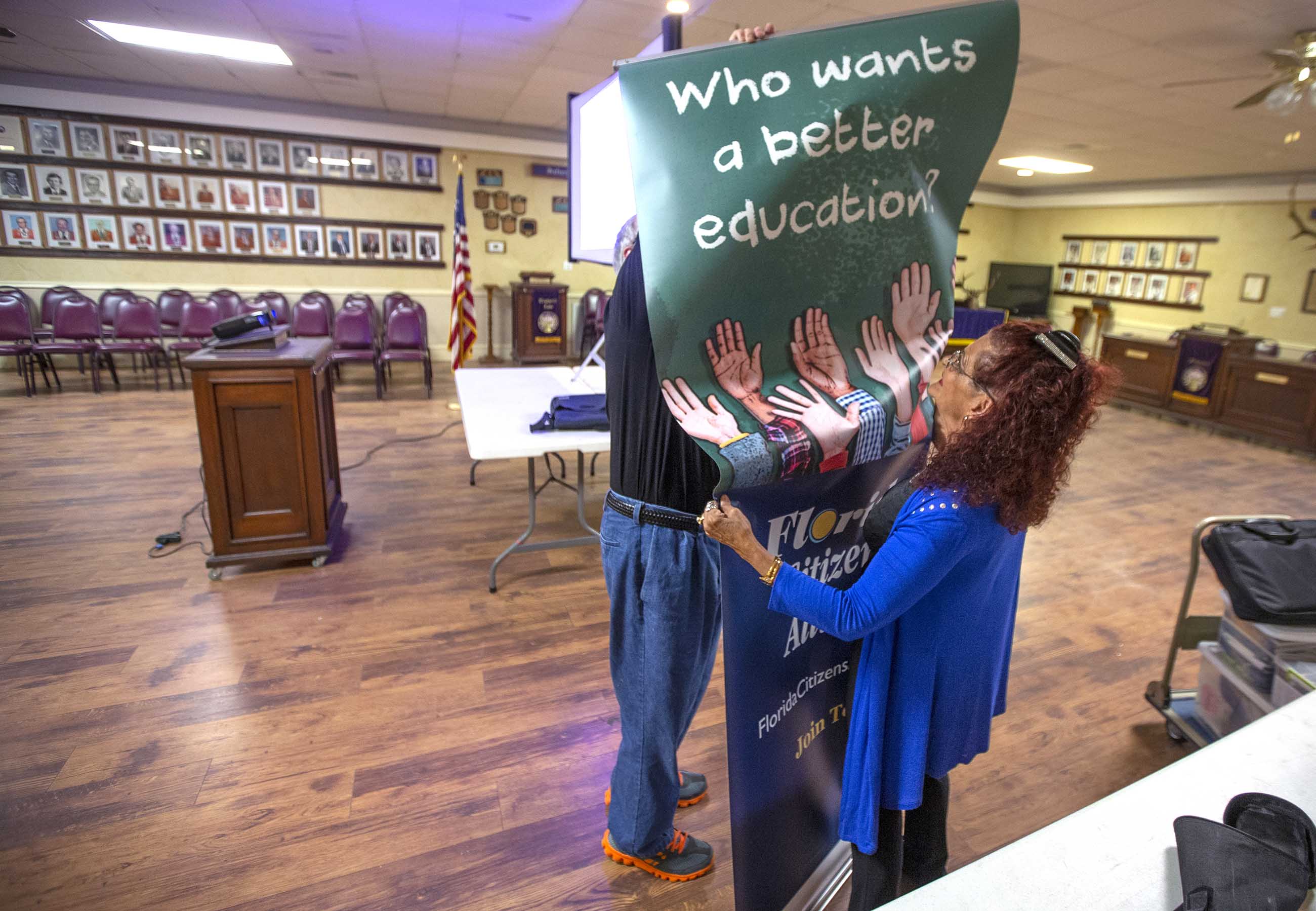
Schoen has been working for years to disabuse audiences of what she considers to be flawed scientific beliefs, peddled by left-wing interests. In this clip from 2012, she explores the physics of climate change.
She continues, “The sad part about it is our kids are not learning physics — because education has been changed from an education knowledge of fact to a knowledge of value. And what does that mean? It is a license to lie,” she says into the microphone.
“Here’s another example,” Schoen said to me at the IHOP. “The global warming doctrine is focused on CO2 — carbon dioxide. A gas that’s necessary for human life. But look at the relationship of volume between CO2 and the ocean. Take a thimble of hot water, pour it into the ocean. Is the ocean going to suddenly become hot? What kind of effect will that thimble have on that ocean? That’s the same relationship between CO2 and our oceans,” she said, grossly misrepresenting the dynamics of the carbon cycle and ocean temperatures.
In a follow-up email, Schoen used the analogy of a glass of soda to clarify her previous comment on CO2. “The soda gets flat as the soda warms,” she wrote. “Warming causes the release of CO2, yet environmentalist[s] claim that CO2 is released first and causes warming. Impossible.”
Speaking to interest groups including Women Impacting the Nation and organizations that promote better self-reliance, Schoen finds dozens of new members who see in the Florida Citizens’ Alliance a highly-structured and quickly growing force for political action — and one that openly calls the bluff on the liberal agenda. “No one is going to come out and say ‘we’re doing this and teaching that.’ But by putting it in the kids’ books, those ideas are with them.”
By adopting the strategy to cut out the indoctrination early, Schoen said, the Alliance can ultimately prevent future policies on climate change and overbearing environmental regulation. “They’re training our kids how to use the environment and environmental laws to restrict ‘We the People,’” she told me, pointing a carefully manicured finger in the air. “As the students become part of our government, they force those ideas on us.”
It was in the context of this partisan-charged atmosphere that the conservative think tank, the Heartland Institute, published its book, “Why Scientists Disagree About Global Warming.” Sent to K-12 and college science educators around the country last year, the book represented a landmark achievement in climate denial scholarship — a slick union of mass distribution, academic journal design, and the same bullet points spoken by Trump administration officials to refute the truth about climate change. Indeed, it had been in the White House Rose Garden, in June of 2017, where Joseph Bast, then-president of the Heartland Institute and longtime editor of its publications, clapped as President Trump became the first and only world leader to pull out of the global climate accord forged in Paris two years earlier — a move that the president’s own secretary of education applauded. Trump’s speech that day used language echoed throughout the book shipped to science teachers across the nation just three months earlier.
At a slim 106 pages, the glossy tome has many of the characteristics of a scholarly publication. Its three primary authors hold Ph.D.s; many of its pages are dedicated to source material from various studies in formally titled academic journals; and the publication is one of many reports supported by the Heartland-backed Nongovernmental International Panel on Climate Change (NIPCC) — named in opposition to the Intergovernmental Panel on Climate Change (IPCC), the 30-year-old United Nations body that has been the primary source for quantifying and distilling global scientific opinion on global warming and its likely consequences.
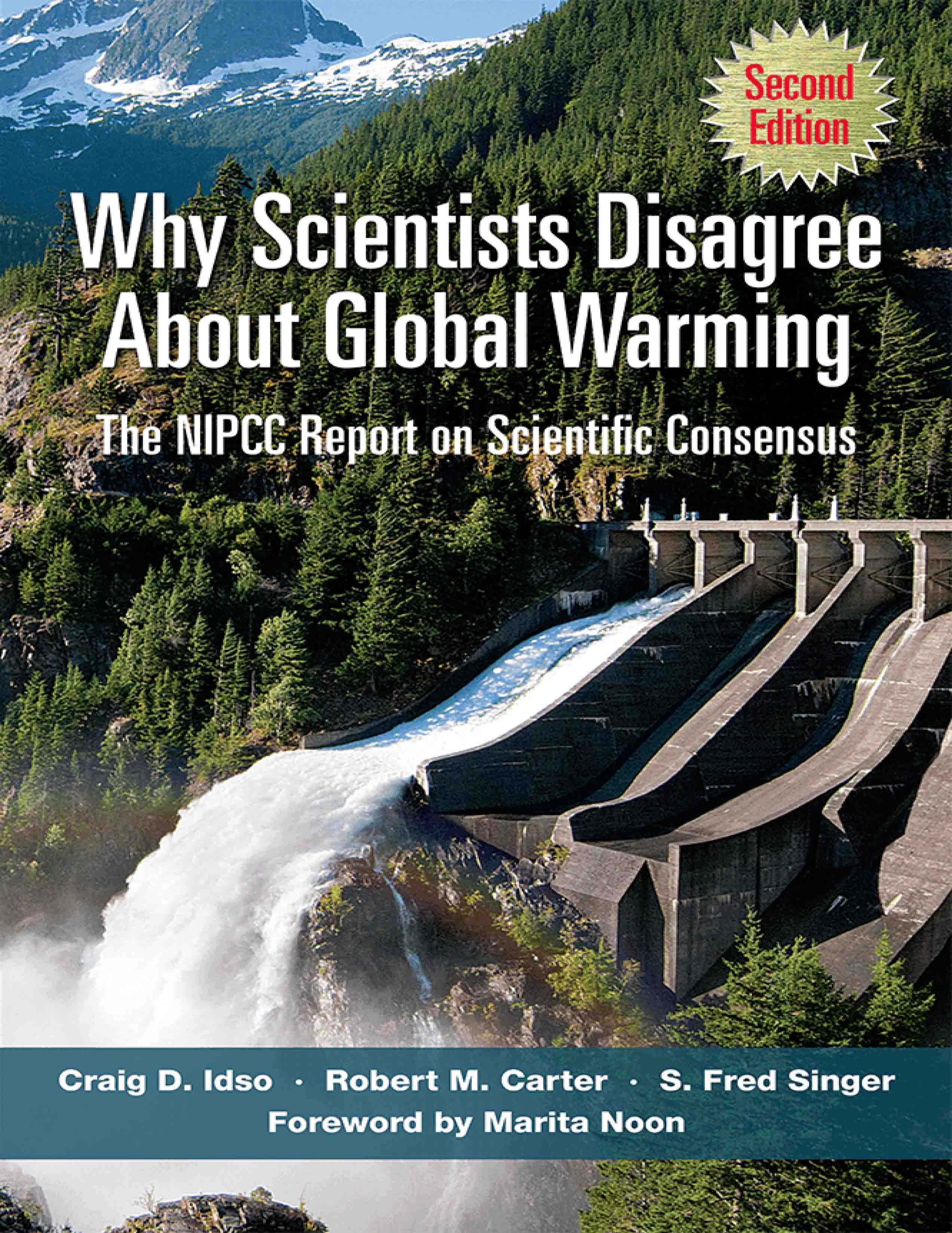
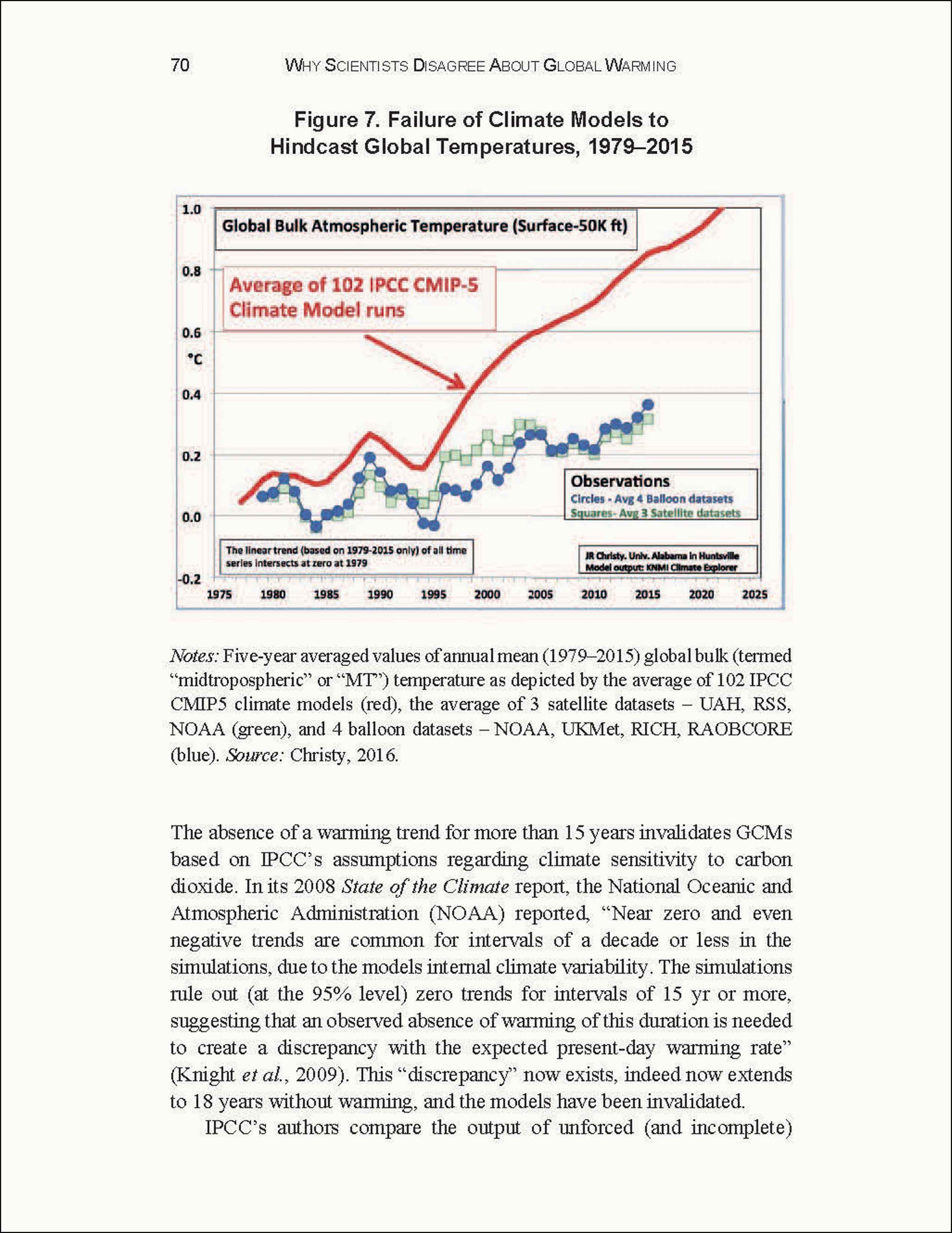
NIPCC stands “in contrast to those of the United Nations’ Intergovernmental Panel on Climate Change (IPCC), which is government-sponsored, politically motivated, and predisposed to believing that dangerous human-related global warming is a problem in need of a U.N. solution,” the Heartland editors write in the preface to their book.
Like Karen Schoen’s recruitment presentations to potential Florida Citizens’ Alliance members, the book keeps its messaging simple and repetitive, with a keen focus on the benefits of excess atmospheric carbon dioxide, the planet’s natural cycles of warming and cooling, and what it insists is ongoing debate in the science community about the veracity of human-caused global warming. At its core, the book flatly denies the prevailing scientific consensus that increased emissions would be catastrophic: leading to dramatic sea level rise, increasingly volatile weather events, record-breaking droughts, floods, and scorching temperatures.
“We conclude no unambiguous evidence exists,” the book declares, “for adverse changes to the global environment caused by human-related CO2 emissions.” This claim is very-often supported not by peer-reviewed journals and studies conducted by respected academics in the science community, but by papers from journals just like the ones in Heartland’s own library of publications, published by conservative organizations and funded by fossil fuel interests.
Like many of the scientists cited in the Heartland book, Madhav Khandekar was previously on the conservative group’s own payroll, at one point being paid $1,000 a month by Heartland itself, for his work as an “environmental consultant.” And last year, the Mercer family, a major Heartland donor, gave $125,000 to the Center for the Study of Carbon Dioxide and Global Change, a group founded by Craig Idso, one of the book’s lead authors. As this science consultant community works collaboratively across dozens of organizations putting out hundreds of white papers and unreviewed journal articles, they continue to build up a mirror body of quasi-scientific literature, a simulacrum of the peer-review process that nonetheless looks at a quick glance like authentic scholarship, with takeaway bullet points as useful for the President in the Rose Garden as they are for a teacher of high school science.
“Some of the teachers thought this is a really good book,” Nina Corley, the science teacher in Texas, told me, recalling how enthusiastically some of her colleagues received the Heartland mailing. “They didn’t even read it. It was sent to the school like a textbook, and people were accepting it at face value,” without considering the motivations behind it. With each chapter dedicated to one core tenet climate change skepticism, the Heartland book offered teachers graphs, lists of key facts, and pages of references.
But critics have argued that those references often trace back to experts who have little expertise in climate science. “They have scientists or people with Ph.D.s,” Corley said.
“They wouldn’t know more than someone off the street about climate,” she added.
The Heartland Institute did not respond to multiple requests for comment.
In a new report on the catastrophic impact of global warming of 1.5 degree Celsius above pre-industrial levels, the IPCC found that, among myriad other effects, millions of people around the globe would become refugees displaced from their homes, and that essentially all of the world’s coral reefs would be destroyed. On the scientific integrity of the claims made by the Heartland Institute publication, Kristie Ebi, a professor at the University of Washington and an author on the IPCC report, said, “The publication from the Heartland Institute is not a scientific critique of the IPCC assessment reports, so there is nothing for me, as a scientist, to comment on.”
In his Florida school district, James Stewart, a member of the FEA, saw how intrigued the head of his science department was with the Heartland mailing. She looked at the book’s content and was “really open to it,” Stewart said. “It looked convincing. I had to explain to her where it’d come from and what that meant. Which was quite concerning.”
Several teachers noted that the book lacked accompanying “pull-out” materials, which limited the ways in which the information could be fully presented to students. But now, with the book printed in its second edition, Heartland has indicated plans to develop lessons and guided activities to augment its material. “That could be quite damaging if that happened,” Stewart said, noting that for teachers who found “Why Scientists Disagree About Global Warming” convincing, a suite of lesson plans could be widely adopted by over-scheduled teachers seeking to fill 200 days of the year with quality content.
In 2017, U.S. Secretary of Education Betsy DeVos made a rare comment on the policies of the Trump administration that were not explicitly related to the Department of Education, praising the White House for withdrawing the United States from the Paris climate accord. “The announcement made today by the President is one more example of his commitment to rolling back the unrealistic and overreaching regulatory actions by the previous Administration,” Secretary DeVos said. “President Trump is making good on his promise to put America and American workers first.”
In an essential way, however, DeVos’ public support for the withdrawal seemed to be a continuation of the conservative movement’s efforts to reshape the nation’s prevailing approach to science education. After all, according to a letter critical of her support of Trump’s withdrawal, the DeVos family has donated more than $6 million to two think tanks that espouse climate change skepticism. (The Department of Education declined repeated requests for comment on this story.)

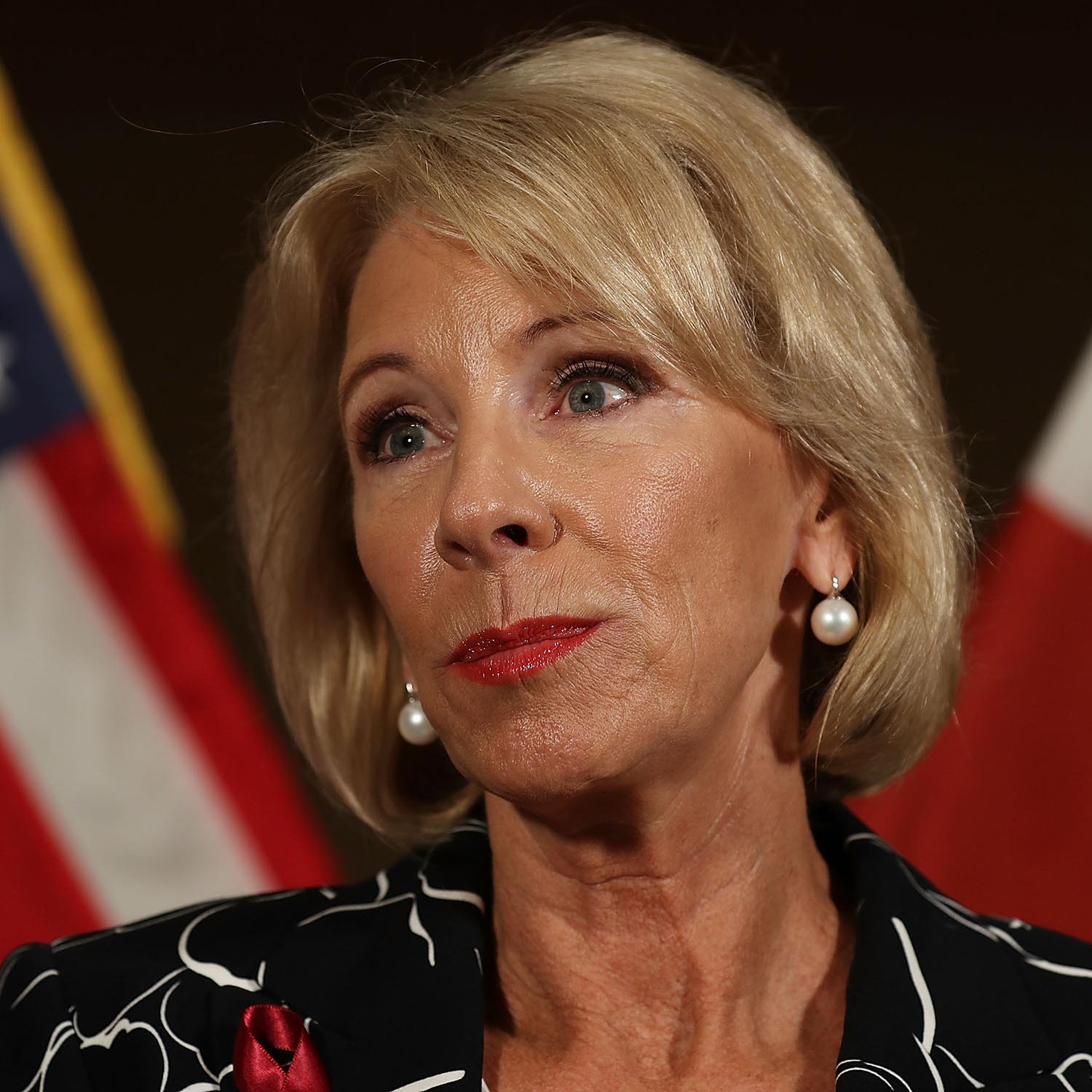
With both the White House and appointed leaders of federal agencies promoting a climate skeptic agenda, the pressure will continue to mount on teachers attempting to present basic climate science in their classrooms. As Brandon Haught found, the classroom isn’t so far away from the family living room where his students have parents who support Trump’s climate change skepticism. “The parents have a personal stake in it,” he said. “They feel it deeply, that somehow what’s being taught in the school is intruding at the home.”
In her work with the Florida Citizens’ Alliance, Karen Schoen wants to help families fight back against that intrusion. (In March, the group tried and failed to pass a bill that would have allowed school district residents to suggest alternative textbooks and other instructional material.) From her home in the Florida panhandle, a region devastated last month by another superstorm, Hurricane Michael — the likes of which scientists say will become more common amid a changing climate — Schoen tells me that teachers should be allowed to be skeptical of climate change, and to advocate for the use of the Heartland Institute book to their school administrator. “There’s a huge atmosphere of hostility for anyone that disagrees” about climate change, she said, emphasizing the overlap between her grassroots work and national organizations like Heartland. “Regardless of how wrong they are about climate change, this isn’t about the climate,” she added. “It’s a liberal political agenda.”
As the intensity continues to increase around climate literacy, organizations like the National Center for Science Education (NCSE) are developing programs that train science teachers how to identify the falsehoods in the research and publications of climate skeptics. Kelly Pipes recently completed training in the NCSE ambassador program, where she learned the “FLICC” system, used for spotting fake experts, logical fallacies, impossible expectations, cherry picking of data, and conspiracy theories.
Noted as the five characteristics of climate denial, Pipes said, the FLICC system more generally identifies the ways in which “someone is pulling your leg, trying to get one over on you.”
Along with training the teachers in how to better source climate science material they can bring into their own classrooms, NCSE has begun working to connect university science departments with their local K-12 science teachers, building a peer community of science educators in districts where administrators or parents might be hostile to climate science. Once a teacher feels like they’ve found some level of support, they can become a bridge to other teachers in hostile environments.
“Those teachers,” Brad Hoge of the NCSE said, “will provide a level of care and comfort to the teachers who’d be less comfortable facing the wrath of their own communities.”
While Hoge sees the importance of providing students with a “basic science literacy,” he likewise hopes that by supporting teachers, he can enable a realization in students as well.
“We have to make plans for the effects of climate change — the flooding, the droughts. And part of that is psychological, knowing why these things are happening and knowing that you have agency to change them,” he said. “The students that understand climate science can then become involved in mitigation planning, or question the underlying causes of climate change.
“Those students understand that they have control over it,” he added. “It’s something they can impact.”
Sean Patrick Cooper is a freelance journalist who’s written about technology, science, and the arts for n+1, The New Republic, Bloomberg Businessweek, The Baffler, Tablet, The Brooklyn Rail, and The Awl, among other publications.
Jane Roberts contributed reporting for this story.











Comments are automatically closed one year after article publication. Archived comments are below.
Came across this blog post engaged, added to faves
Humanity added to natural warming, but from increased water vapor, not CO2. http://globalclimatedrivers2.blogspot.com Blinded by a misguided focus on the increase in CO2, ‘climate science’ has apparently failed to notice that in the period 1988-2002 water vapor molecules increased more than 5 times as fast as CO2 molecules and about twice as fast as calculated from the average global temperature increase. Since 1900 WV molecules increased approximately 3.6 times as fast as CO2 molecules. According to Spectracalc/Hitran, at zero altitude there are about 24 H2O molecules for each CO2 molecule and each H2O molecule is about 5 times as effective at absorb/emit of thermal (LWIR) radiation emitted from earth surface as a CO2 molecule.
The good news:
1. WV increase is self-limiting so no catastrophe from warming.
2. The increasing water vapor is delaying the average global temperature decline expected by many as a result of the quiet sun and declining net of ocean surface temperature cycles.
3. CO2 increase has increased plant growth (i.e. food) by at least 15%.
It is not possible to teach “climate science” in grade school. There is no curriculum for teaching heat transfer, computer modeling, atmospheric chemistry, or the many other basic sciences needed to reach conclusions over what is going on with Earth’s climate. What the left wants to do is simply present the conclusions of some climate scientists as facts, and this makes the effort indoctrination. An analogy would be presenting the results of Einsteins General Relativity before the students have the basic math and physics training to make sense it. This entire article assumes climate science is settled, that the preferred conclusions are unassailable and so any contrary position must be false and presented with malicious motive. That is far from the truth. Thousands of highly accomplished and respected climate scientists DO NOT AGREE with climate alarmists. They all have sound, scientific bases for their disagreement, grounded in decades of research. Climate science is far from settled, and the conclusions of one politically and financially motivated segment of the climate science community should not be presented in grade school classrooms as fact.
“Thousands of highly accomplished and respected climate scientists DO NOT AGREE with climate alarmists.” Who are these thousands? If you are thinking of the OISM petition of 31,000 “scientists”, you don’t actually have to be a scientist to sign it, let alone a climate scientist. Please do fact-check me: actually go and look up the documented requirements for signing it, and by all means, find out what steps OISM takes to verify that you meet the requirements (AFAIK they don’t verify.)
And when you say “alarmists”, are you referring to climate scientists who agree with well-established findings such as the ECS probably being in the range 2.0-4.5°C? (ECS or Equilibrium Climate Sensitivity is the long-term global average temperature change that would eventually result from doubling the atmospheric CO2 concentration.)
I suggest reviewing the paper “Consensus on Consensus”, or my review article about the various studies of the scientific consensus at https://medium.com/@qwertie/scrutinizing-the-consensus-numbers-70faf9200a0c
I earned a Ph.D. in physics. I rely on original sources of climate scientists; RealClimate.org is one. RealClimate is a commentary site on climate science by working climate scientists for the interested public and journalists. Read it for up-to-date info. http://www.realclimate.org/
I am not a climatologist. So I do the next-best thing: I read original sources, including RealClimate and technical research papers by James Hansen and his colleagues. His blog is: http://csas.ei.columbia.edu/ and website: http://www.columbia.edu/~jeh1/
Jane, it’s difficult to believe someone wit a PhD in any STEM field would promote “teaching” climate science to a K-12 student with no significant background in the subject. Climate Science, when practiced correctly is extremely complex, possibly one f the more complex subject in the sciences, requiring a strong background in thermo and fluid dynamics. Much of the science behind climate is considered mathematically intractable. This isn’t a subject that can be “taught” in 6th grade, or even 12th for most children.
It’s correct to consider this “indoctrination” rather than education.
True scientists require evidence-data to support their claims. Schoen from above just says this or that isn’t true with one example. First she doesn’t understand science, physics, or the need for more than one piece of evidence. Then again, these same people probably only listen and accept one source for their news, other ideas, etc.
For example, Shoen’s demonstration of water level not increase when the ice in it melts does not take into account the glaciers that are NOT in the ocean. Her argument-in fact Florida Citizens Alliance, Heartland, all of these groups, are not real arguments and are exactly what they are supposedly fighting. If you do not accept what they tell you, one are wrong. They do not provide sufficient evidence but instead expect you to just believe them. Their ignorance is arrogantly evident.
This article emphasizes the need for literacy of all citizens, science literacy, especially. Reading words is not enough, we need to read data tables, graphs, and just as important, our surroundings, read the patterns in our environment.
Climate has always changed. The issue today is how much of the ongoing change has an anthropogenic origin. Clearly human activity impacts climate. I observed and measured this firsthand during assignments for NASA during two field campaigns in Brazil during that country’s burning season. The enormous coverage of smoke across that country caused significant reductions in temperature, photosynthetic radiation and UVB at my research sites near Cuiaba and Alta Floresta and the Cristalino River.
As for climate, I was an expert reviewer for the IPCC during preparation of its AR5 report. From this experience I learned that all 40 climate models used by the IPCC failed to accurately forecast temperature changes. Why? The models are reliant mainly on increasing CO2 and fail to adequately incorporate water vapor, clouds and other aerosols. These weaknesses are well known within the climate science community. Yet they continue to make definitive statements about the role of CO2 in climate change/warming without even mentioning the roles plays by clouds, smoke, dust and water vapor.
Unfortunately, the teaching of climate science has become an agenda driven by a relatively small fraction of the scientific community. The traditional role of skepticism in science has been largely abandoned by many of the key players, as some made abundantly clear in their Climategate emails. Even the National Academy of Science’s outstanding booklet “On Becoming a Scientist” has been affected, for the discussion about the vital role played by skepticism in science in editions 1 and 2 was removed in edition 3. (An editor told me they lacked space in edition 3–but I counted more than 10 pages of white space. He said they would try to return skepticism in the next edition.)
Qualification: Since 4 Feb 1990, I have measured the ozone layer, total column water vapor, the optical depth of the atmosphere and solar UVB. I have calibrated my instruments at Hawaii’s high-altitude Mauna Loa Observatory every summer since 1992. (This experience led to a NOAA assignment to write “Hawai’i’s Mauna Loa Observatory: 50 Years of Monitoring the Atmosphere.” University of Hawaii Press, 2012.) I’ve consulted for EPA, NASA, NOAA, NSTA, National Geographic Society, TERC, Concord Consortium and others. I was a senior judge for the NSTA Duracell Competition and co-PI for the GLOBE Program’s sun photometer program. I wrote some 35 electronics books and developed lab kits for Radio Shack. I’ve published many papers about my atmospheric science with more on the way.
Well, good. If there’s one thing that’s been lacking in the field of climate science, it’s skepticism. in any event, the bad angel in me is not sympathetic. If Leftists can influence history books to minimize the “dead white guys”, then this is just giving them a dose of their own medicine. Don’t like politicization of education? Sorry…that train left the station a long time ago. And guess who was driving the train?
Article starts by noting a hurricane. Clearly trying to imply that global warming led to the hurricane. When science shows that frequency of hurricanes has decreased in the last decade. Amazing way to start complaining about some ignoring science. Find a mirror dude.
Is it so unreasonable, for example, for students to look at the graph of the ensemble of climate model outputs vs. the UAH global lower-atmosphere temperature record and weather-balloon records, as presented to Congress by John Christy, and consider what it means for observations to diverge from theory? Skepticism and the possibility of falsification are what distinguishes science from religion. AGW is fast approaching the status of the latter.
Many of us engineer types do not dispute the GW part, but we are not so sure about the extent of the A.
The article is written almost in a panic mode of someone whose religious beliefs are under attack from a believer in climate change, one who will chant “the science is settled” while protesting 100 feet up a redwood.
The reality is, and even the undisputed authority, the UN IPCC admits, there is no computer model for the last 5 decades of “global cooling… global warming… climate change” that accurately models the climate… or even next week’s weather. None. Zip. Nada. Zero.
And… all the authorities doubt a successful model will be around the corner for decades.
To be blunt to the author… skepticism is absolutely key to science and the advancement of science. Questioning everything…even giants like Newton and Einstein, is how humanity advances. The people of Florida want skepticism taught in their science classes? The want to question the data of global warming… climate change … and teach their children to challenge the data in full debate? Good for them!!!
What the author wants is not a science textbook. He want a scripture to preach his climate change dogma and faith as science.
If I believe in cyclical glaciation due to precession, does that make me a denier? If sea levels were 200 feet lower 16,000 years ago and have essentially stable for the past 8,000, does that mean I’m anti-science? If humans can’t go totally off carbon-based energy sources for the foreseeable future, is the only hope for the planet a catastrophic decrease in humanity? Should we encourage students to think through questions like “what causes climate change” as part of their education?
Just a thought from a geology background, but not a climatologist. I can tell you what happened in the past, but unlike climatologists, we’re unable to predict the future. While intuitively, mankind should be impacting our biosphere, would love to know how much a major volcanic eruption impacts and to what degree; solar change in output and why do people build their cities at sea level on deltas and fill next to large bodies of water. Before lowering the standard of living of industrialized countries in the quest to save the planet, planetary climate scientists might want to do more work to build a consensus. I’m certainly a skeptic.
I’m a geologist and do not feel qualified to make decisions on what is or isn’t influencing the Climate. However, what
I do know is that Climatology, as a science, is off the rails and has become agenda driven. Its accepted methodology is a travesty.
Is the world warming? I don’t know. Is it warming because of human activity? I don’t know. If warming, is it a negative? I don’t know.
Beats me how the ‘science is settled’ when there is little or actual science.
I don’t deny that less than 25,000 years ago northern Illinois was covered by more than mile of glacial ice. I don’t deny that less than 12,000 years ago mammoths were flash frozen in Siberia with fresh grasses still in their stomachs. I don’t deny that about 8,000 years ago, the oceans were about 0.7 degrees C. warmer than they are today. I don’t deny that 1,000 years ago Vikings in Greenland were cropping barley so they could use the grain to make beer. I don’t deny that millions of Europeans died in the Great Famine of 1315–17, caused by cold and wet conditions. I don’t deny that the Thames River froze solid to such an extent that during 26 separate winters from 1408 until 1814, Londoners were able to hold a Frost Fair on the ice.
I don’t deny that Anasazi settled in the Mesa Verde region of the American Southwest about 1,600 years ago to practice subsistence farming. The climate in the region slowly became much more dry. By the end of the 13th century the population collapsed. I don’t deny any of this.
The truth is that the climate is always changing. There would be something wrong it it did not. The real question for us today is to what extent is human activity harming our biosphere in a material manner, so that it endangers our food and ecosystem. Up until now, advocates of “climate change” demand solutions that converge far more on socialism than on anything else. This is a means to an ideological ends having nothing at all do do with protecting the biosphere. It is intended to advance the long awaited secular Utopia. They don’t deny their goal.
The best way to silence, or reduce the noise of, critics is to go around them: Show how alternative energy is now cheaper for utilities than other sources, and is getting cheaper. Recent bids for supplying continuous, 24-hour power is now for wind plus electrical battery storage at 2.1 cents/kWh Second lowest was PV plus storage at 3.2 cents/kWh. By Comparison, if Plant Vogtle nuclear plant is finished and operational the wholesale price is over 15 cents/kWh, and it must run at that cost for 50 years to pay off.
By contrast, we put up solar PV on our rooftop three years ago, with what I calculated to have a 15-17 year payback. Before it could be installed, we got a VW e-Golf, and found out the savings took the PV system payback down to three and one-half years. The addition of the second EV has paid it all off, and now all our fuel for house power and horsepower is free, and those electrical systems do not need mechanical maintenance. We have no oil or changes, no transmission worries, no tune-ups, no emissions tests, no injector problems or need for mufflers,no need to go gas up.
If we had to pay for the power we charge with at night. the VW would cost 3 cents/mile to drive and the Tesla Model S, P 85 would cost 4 cents/mile. The scientists do not needed to convince the Deniers, we can just change the technologies.
Skepticism is the life-blood of science. Modern science as elucidated by Karl Popper, requires skepticism. It is built into the scientific method that as peer-reviewed papers are published other scientists attempt to replicate the experiment (the authors of the study in question are required to turn over their data, methodology, etc., whatever is necessary for replication). The scientists may agree or disagree with the results of the study that does not matter. It is only after the experiment has been replicated many times that it has any standing. One failed attempt to replicate the experiment kills the hypothesis.
Most experimental work done on global warming/climate science is performed on computers using non-empirical (computer-generated) data. Non-empirical data is not allowed by the scientific method.
Finally, I am tired of hearing about concensus or that the science is settled. Science can never be settled (unless of course, you know the future). Consensus is a political term having nohjing to do with science. History is replete with examples -last year 140 years of scientific ‘certainty’ was overturned when it was discovered that a lichen not only required certain types of algae and moss, but also a particular type of yast to make the symbiotic relationship work.
It appears that Jason Otto is unfamiliar with the studies that completely debunked the “97% of all scientists agree” lie. No, 15,000 scientists never said that there is global warming and that it is manmade and reversible. The actual number is a little lower than 97%; it is 0.3%. A minor difference, to be certain, but a telling one.
Very few scientists even believe that we are in a global warming cycle; they are afraid of being found as foolish as those in the 1970s who were crying that manmade global cooling was about to initiate a new Ice Age (remember the covers of Time, Newsweek, and others back then?).
The truth is that, based upon longer and more germane cycles than those falsely touted by the IPCC, this planet of ours is very close to the end of a warming cycle, and that we are headed for our next Ice Age. This won’t happen tomorrow, but within a couple of centuries we should see some effects.
Scientists are also a little too intelligent to attempt to isolate one specific factor as the leading cause of global warming when everyone should know that there are hundreds if not thousands of contributing factors. Carbon dioxide is just one of them, and a very minor one at that. Water vapor is much more significant, but Al Gore hasn’t figured out how to become a gazillionaire by taxing water vapor.
Oh, and by the way, carbon dioxide is essential to all life on earth. Some scientists estimate that if the level of CO2 in the atmosphere were ever to approach 150 ppm, all animal life (and human life) would cease because we would be unable to feed ourselves. We came dangerously close to that level prior to the Industrial Revolution, when the level fell to 280 ppm, the lowest level ever known on earth. We should count our blessings that technology has made a contribution, albeit a tiny one, to making human life possible by increasing the amount of CO2 in the air.
Let’s say that we were foolish enough to allow the expenditures of many trillions of dollars in an experiment to reduce CO2 levels, and that we were able to enlist the firm and unwavering support of every political entity and corporation on the planet. That in itself is a complete impossibility, but let’s say that we could. We will look pretty foolish when it is finally and conclusively discovered that:
1) Reducing CO2 levels is virtually impossible even if the world’s population moves back into the Stone Age,
2) Reducing CO2 levels has no impact on global warming or climate change,
3) We have reduced crop yields and forced millions into poverty and starvation because there was no longer enough CO2 in the atmosphere to feed all of us.
As they say, when Al Gore was born there were 7,000 polar bears. Now that they are threatened by global warming/climate change, their numbers have declined to only 33,000. (That’s not a typo.)
Sorry, Al. Some truths really are inconvenient.
Tom Wilson,
Even if AGW was occurring as hypothesized by the IPCC and other environmentalists, i.e. the worse case is currently happening and will continue into the future, the chance of the temps being higher on those days in 2040 is 50/50. I wouldn’t bet $10k on red on roulette. However, I’d be willing to bet that at some point between now and 2040 the 30yr trend of Global Average Temperatures in the UAH satellite record with 11yr smoothing decreases in excess of the 95% confidence internal of 0.1C, or in other words that the records show a period of global cooling between now and then.
Just because we are likely currently in a period of global warming, that doesn’t mean that it is harmful, a crisis, unprecedented, or won’t reverse on its own.
But when it gets too warm from greenhouse gases plants can’t grow and like the forests and wildfires now they start to burn giving back their carbon to the atmosphere and increasing temperatures to levels impossible to breathe in. That’s where we’re at now unless we extract some of those gases to cool us down and avoid total loss of food and extinction.
I will make a bet with anyone.
You pick three cities and three dates.
I will bet that the temperature in those three cities on those three dates (9 data points) will be higher in 2040 than in 2021.
We each put $10,000 into a trust and the money will go to the charity of your choice if the temperature is lower in 2040 than in 2021.
If the temperature is higher in 2040 then the money goes to the charity of my choice.
I will pay the legal bills to set up the trust.
Any takers?
You KNOW that AGW is real. You are just hoping for the best. Your children and grandchildren will look back and think that people who didn’t accept the science of AGW in 2018 were stupid and wrong and caused massive problems for their generations.
Nothing says ‘scientific’ like the avoidance of skepticism?!! Simply unbelievable. Science is all about acceptance of current orthodoxy?!! It isn’t that people don’t trust science, they don’t trust obviously unscientific beliefs like “No Skepticism!!!”
The author has confused political conformity with science.
AAARGGHHHHHH!!!
This is most probably how Stephen Hawking would have felt arguing with the “Indians of the headwaters of the river Humaita” – about the world being round not flat. If Pythagoras knew that some people are still arguing about it 2000 + years later he would be laughing (or crying) his ass off. Especially when we are in the age capable of sending people to space and splitting the atom.
First of all let me tell you, with out science and technology which are one and the same we would have nothing today – we would still be monkeys in the bush.
Then, let me clarify something for the cognitivaley challenged (and this is not an opinion – this is 2000 years worth of accumulated effort by the worlds leading, most intelligent, most educated thinkers ) – fact :
Climate change is a natural AND……CURRENTLY a man made / driven occurrence – duh. Slowly when occurring naturally – accelerated by the impact of mankind’s actions. END OF STORY. Same as extinction and evolution.
People seem to love scientists when they create the light bulb or developed penicillin but when it comes to making people uncomfortable or messes with business revenue streams or politicians amounts of votes, then all of a sudden scientists have no idea what they are talking about. I suppose CFC’s are great and did nothing to destroy our ozone layer? This didn’t affect our climate? Nasa made a big deal about it because of nothing and the world banned it for fun?
Funny how we got to the stage where your common shmoe on the street (who has never invented anything , discovered anything or even finished higher level education or taking it on them self to do research or anything towards self edification) knows more than scientists? 15000 well educated, well researched, people who have taken the time and done the experiments and gone through the data, leading thinkers, teachers, professors and scientists have warned us about the part we play in climate change. Why would they lie or make up stories anyway? What do they have to gain? Money – there is no money to the scientist who shows how we are stuffing up our planet by messing up the climate faster than it would have done on its own. There is no fame in it either. One last time – why would 15000 scientists lie about it -what do they have to gain?
We’re going to tell them they don’t know what they are talking about? Well if professors, teachers and scientists have no idea what they are talking about why the hell does anyone go to school. Why don’t we just scrap all education and descend into uncivilized chaos living in the bush. Repeat the roman 1000 year long DARK AGES. At least the earth will last a bit longer, provided there are no nuclear bombs left lying around (which I also suppose don’t impact climate in any way – according to these fools).
Mothers, fathers, family, teachers, thinkers, children – every one who cares about something besides ego validation and attention: do the research, educate yourself – stand up for the truth and whats better for all of us (ALL THE EARTHLINGS) and put these idiots where they belong. In a dark room, locked up from humanity, far far away.
Wake up, stop arguing to win – start arguing to know the truth.
To Richard Ellison – if the science has been sloppy until now – then you do it (make sure to follow scientific rules and procedure though – like same experiment, same result = conclusion). Also the nature of the field of science is to grow. You accept current scientific understanding and build from it, in the process you challenge current understanding and test test test. If there are any errors you fix them, because in science you cant move forward if you built on error…………………..
An example of science:
Over the course of human history, people have developed many interconnected and validated ideas about the physical, biological, psychological, and social worlds. Those ideas have enabled successive generations to achieve an increasingly comprehensive and reliable understanding of the human species and its environment. The means used to develop these ideas are particular ways of observing, thinking, experimenting, and validating. These ways represent a fundamental aspect of the nature of science and reflect how science tends to differ from other modes of knowing.
Although scientists reject the notion of attaining absolute truth and accept some uncertainty as part of nature, most scientific knowledge is durable. The modification of ideas, rather than their outright rejection, is the norm in science, as powerful constructs tend to survive and grow more precise and to become widely accepted. For example, in formulating the theory of relativity, Albert Einstein did not discard the Newtonian laws of motion but rather showed them to be only an approximation of limited application within a more general concept. (The National Aeronautics and Space Administration uses Newtonian mechanics, for instance, in calculating satellite trajectories.) Moreover, the growing ability of scientists to make accurate predictions about natural phenomena provides convincing evidence that we really are gaining in our understanding of how the world works. Continuity and stability are as characteristic of science as change is, and confidence is as prevalent as tentativeness.
“As per American Association for the Advancement of Science – Scientific Knowledge Is Durable”
“Scientific Knowledge Is Durable” But what if what you imagine, but cannot test, is not science at all?
No. “Scientific Knowledge is testable” if it is anything useful. And Al Gore’s team lied and withheld data from people. They fudged figures, and no-one else has been able to make the data do the same thing. Are you a knowledgeable scientist with the ability to review this highly complex, multi-discipline field?
Do you really believe in the data? Then demonstrate why all the models failed to predict no increase in global average temperatures for the last 19 years. This was despite the fact that all models said temperatures would rise with the CO2 increase, which has been +100 ppm since records began. This is a rise of 0.03% o 0.04% CO2. Gosh. And you are so sure this miniscule rise of CO2 is going to make the planet uninhabitable? Lunacy. Read what Mr Mill has written and do some real science. Grow up and stop ranting please.
I have two questions for proponents of AGW:
1. What’s the temperature going to be at 4th and Main at noon one month from today? They purport to be able to accurately predict the temperature, to within tenths of a degree, 20 years from now yet can’t tell us what it’s going to be a month from now.
2. What’s the temperature right now? I live near Orlando, Florida. Earlier this evening I heard the nice weather lady say (pp.) “Currently it’s 83 degrees downtown, 82 at the airport and 84 at the attractions.” How does that go into the records?
1. No, they do not “purport to be able to accurately predict the temperature … 20 years from now.” Climate models do not predict the weather. The supercomputer models are essentially low-resolution weather simulations that are run many times, which collectively characterize the climate. The word “climate” refers to the range of weather patterns, such as minimum/average/maximum precipitation/temperature. Put “climate spaghetti plot” in Google images to see this in action. You can see that the simulations collectively calculate a range of possible temperatures, not a single temperature.
2. “How does that go into the records?” It depends what country you live in. The U.S. has the USHCN but I’m not well-versed in its practices.
If the Heartland Institute is more credible on the history of climate change than the bubbly headed CO2 AGW proponents that over influence the IPCC, perhaps they should be acknowledged.
The IPCC models have not been accurate in predicting the future as the actual temperatures which occurred indicated. The reports admitted that factors responsible for past climate change were not used in many instances.
The students need a basic understanding of climate and the factors (periodical oceanic/atmospheric oscillations, Solar sunspot cycles, Milankovitch orbital cycles, geological events, etc.) that have contributed to climate change in the past going back to the Pleistocene era and beyond. They should know that there was no North Polar ice cap until 2.6 mya or that, since the end of the Pleistocene, glaciers several mile thick in New York latitudes melted and sea levels have rose 400 feet since then. They should be aware of CO2 levels then and now. Optimal levels of CO2 in green house farms are 1000 ppm. Are current CO2 levels of 400+ ppm a problem as the AGW proponents insist.
The AGW proponents have misappropriated ‘climate change’ to malign those who advocate that the historical factors responsible for past climate change challenge the AGW theory’s conclusions. The opponents of AGW are not deniers but realists.
Errant nonsense.
Perhaps, when Florida is mostly underwater, they might start to think differently. Well, probably not, since they don’t seem to understand what science is or how it works.
Take two pennies. Lay one flat on a table top. Next take another penny and lay it flat upon the first. The height of the two pennies is approximately 3mm, the average annual rise of sea level. Now take one penny away because the seas have been rising 1.5mm per year for centuries. One can reasonably say that the height of the remaining penny, 1.5mm is man’s contribution to sea level rise.
Eventually, that may cause Florida to be inundated – but not for a very, very, very long time.
What is more concerning is that Florida is sinking, due to a number of factors: pumping ground water, glacial rebound, etc.
It is called science – a subject the Miami Herald rarely covers. They prefer narrative and sensationalism – but so much for the media, at least let’s keep it out of the schools.
@Brian McChesney
In that vein, I believe every obituary should at least begin in the following manner:
“Modern Humans, which arose some 3oo,000 years ago, are subjected to a repeated cycle and continuous cycle of life followed and death. The small segment of the cycle we are currently concerned with (John Doe) began 57 years ago and ended last Tuesday when John Doe was killed by a massive heart attack. Given the long history of life and death, it should be clear that the broader historical cycle of life and death was little influenced by John as an individual’s: overconsumption of food and alcohol, his internet argument induced hypertension, his choice to live entirely in a sauna the temperature of which he increased a fraction of a degree every week, or what 98 percent of the medical experts interviewed called a “pathological need” to deny the impacts his lifestyle was having on his health. It should be clear that with or without John the cycle of life and death will continue. John would want us to close with his favorite red-herring argument, noting that a full accounting of the historical causes of life and death for the entirety of human history hasn’t been completed fully-100-percent-totally-completed, so his behavior today (well at least until last Tuesday at 7:07 PM) should also be discussed outside the context of modern medical knowledge about the results of over-consumption in a closed system (his cherished sauna).”
If you think this is scary… read: The Shadow President, a description of how Pence believes he is destined by God to become the next president and create a theocracy in this country. This FL group is right up his alley. Dangerous because their “science” is based on Bible stories not on science. The book was a REAL wake up call! Undark has the right idea! Expand your education, learn, learn, learn.
Science should be taught with heavy skepticism not as an indoctrination. If everyone is taught to accept current science there will be no new discoveries. Many scientists are skeptical of the current climate change theories. The only people that appear certain in their beliefs are those that have a financial (grants, etc) and those without a science background. Much of the work done to this point is pretty sloppy science.
I read this with great interest this morning since next week, in the college psychology survey course I teach, climate change is coming up as part of the unit on stress and health. I try to teach my students to be critical readers, healthily skeptical of how psychology studies, presents research, and practices. What I don’t want is for them to throw out the baby with the bath water: I want them to understand and accept the science on climate change, to look at its psychological implications, and to be empowered to take their knowledge out into the world and act on it. But most of all, I don’t want my science teaching to be dismissed, attacked, and possibly silenced as political. This should not be a political issue! So I found myself wishing, as I read, for organizations like the ones being developed for environmental science teachers that would support social science instructors like myself in learning more about climate change and how to teach it; in identifying flaws in climate-skepticism articles, papers, and videos; and in finding and giving (in an organized way) mutual peer support out here in the trenches.
Every article and textbook on climate change should be required to start with the following:
“The Pleistocene epoch, which started some 2.6 million years ago, has been characterized by repeated periods of glaciation, followed by inter-glacial periods. The most recent inter-glacial period started approximately 12,000 years ago when the ice sheets that covered much of North America and Europe began retreating. It should be clear that historical human activity had no impact on this cycle of glacial and inter-glacial periods and the drivers of this climate change are still unclear.”
“the drivers of this climate change are still unclear”
Mainstream climate scientists are pretty much in agreement about how this works. Here’s how it works: the 100,000-year cycle we’ve seen for the past 800,000 years is driven by orbital forcing (Milankovich cycles), and that this orbital forcing causes small temperature changes which change the solubility of CO2 in the oceans, which in turn change the CO2 concentration in the atmosphere, which increases or decreases global temperatures, which further alters the solubility of CO2 in the oceans, and so forth until the orbital cycle changes phase.
You presented no data. The story you outlined may be fine, but where are the data?
M. Mann and Al Gore’s work was deception, and the data was fiddled. This is plain for anyone to see. But you would deny this.
Are you going to listen or review with me the details in the real science, and can you do mathematics to the level required to analyse the data with proper confidence limits, understanding the impacts of the assumptions?
http://www.huffingtonpost.com/michael-e-mann/judith-curry-climate-change_b_6000636.html
-And the report on the 2015 Senate hearing is long but sufficiently detailed so that the lay-person can get the principle points. I highly recommend it for a balance of truth from both sides. Frank and full presentations:
DATA OR DOGMA? PROMOTING OPEN INQUIRY IN THE DEBATE OVER THE MAGNITUDE OF HUMAN IMPACT ON EARTH’S CLIMATE
https://www.govinfo.gov/content/pkg/CHRG-114shrg21644/html/CHRG-114shrg21644.htm
At a Will Steiger climate science workshop in Minnesota, Eugenia Scott of the National Center for Science Education spoke on the issue of climate change education. It was August of 2012 and she predicted that climate science would be the next evolution challenge in our science curriculums. In fact it already was. This is an excellent article. As a retired biology teacher I was very involved in evolution education and the promotion/development of sound evoluttion based biology curriculum. It is an ongoing challenge.